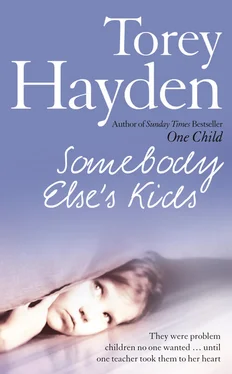Lori was not doing well. The hoped-for maturation in her brain had not yet occurred. In addition to her inability to pick up written symbols, she continued to display other common behaviors of brain-damaged children such as hyperactivity and a shortened attention span. Although Lori had not been on my original roster of resource students when school convened, she appeared at my door during the first week with Edna close behind. We had here what Edna called a “slowie”; Lori was so dense, Edna told me, you couldn’t get letters through her head with a gun.
So for a half hour every afternoon, Lori and I tried to conquer the written alphabet. I had to admit we were not doing stunningly. In the three weeks since we had started, Lori could not even recognize the letters in her first name. She could write L-O-R-I without prompting now; we had accomplished that much. Sort of. It came out in slow, meticulously made letters. Sometimes the O and the R were reversed or something was upside down or occasionally she would start on the right and print the whole works completely backwards. For the most part, though, I could trust her to come close. I had scrapped the pre-reading workbook from the reading series because with two years of kindergarten she had been through it three times and still did not know it. Instead I started with the letters of her name and hoped their relevancy would help.
Her difficulty lay solely with symbolic language: letters, numbers, anything written that represented something, other than a concrete picture. She had long since memorized all the letters of the alphabet orally and she knew their sounds. But she just could not match that knowledge to print.
Teaching her was frustrating. Edna certainly was right on that account. Three weeks and I had already run through all my years of experience in teaching reading. I had tried everything I could think of to teach Lori those letters. I used things I believed in, things I was skeptical about, things I already knew were a lot of nonsense. At that point I wasn’t being picky about philosophies. I just wanted her to learn.
We began with just one letter, the L. I made flash cards to drill her, had her cut out sandpaper versions to give her the tactile sensation of the letter, made her trace it half a million times in a pan of salt to feel it, drew the letter on her palm, her arm, her back. Together we made a gigantic L on the floor, taped tiny construction paper L’s all over it and then hopped around it, walked over it, crawled on it, all the time yelling L-L-L-L-L-L-L-L! until the hallway outside the classroom rang with our voices. Then I introduced O and we went through the same gyrations. Three long weeks and still we were only on L and O.
Most of our days went like this:
“Okay, what letter is this?” I hold up a flash card with an O on it.
“M!” Lori shouts gleefully, as if she knows she is correct.
“See the shape? Around and around. Which letter goes around, Lor?” I demonstrate with my finger on the card.
“Oh, I remember now. Q.”
“Whoops. Remember we’re just working with L and O, Lor. No Q’s.”
“Oh, yeah.” She hits her head with one hand. “Dumb me, I forgot. Let’s see now. Hmmmm. Hmmmm. A six? No, no, don’t count that; that’s wrong. Lemme see now. Uh … uh … A?”
I lean across the table. “Look at it. See, it’s round. Which letter is round like your mouth when you say it? Like this?” I make my mouth O-shaped.
“Seven?”
“Seven is a number. I’m not looking for a number. I’m looking for either an O,” and here I make my mouth very obvious, “or an L. Which one makes your mouth look like this?” I push out my lips. “And that’s just about the only letter your lips can say when they’re like that. What letter is it?”
Lori sticks her lips out like mine and we are leaning so intently toward one another that we look like lovers straining to bridge the width of the table. Her lips form a perfect O and she gargles out “Lllllllll.”
I go “Ohhhhhhh” in a whisper, my lips still stuck out like a fish’s.
“O!” Lori finally shouts. “That’s an O!”
“Hey, yeah! There you go, girl. Look at that, you got it.” Then I pick up the next card, another O but written in red Magic Marker instead of blue like the last. “What letter is this?”
“Eight?”
So went lesson after lesson after lesson. Lori was not stupid. She had a validated IQ in the nearly superior range. Yet in no way could she make sense of those letters. They just must have looked different to her than to the rest of us. Only her buoyant, irrepressible spirit kept us going. Never once did I see her give up. She would tire or become frustrated but never would she completely resign herself to believing that L and O would not someday come straight.
The day after Boo arrived, Lori came to my room tearful. She was not crying but her eyes were full and her head down. Without acknowledging me, she hauled herself across the room to the table and tiredly threw the workbook down on it.
“What’s wrong, babe?” I asked.
Shrugging, she yanked a chair out and fell on it. With both fists she braced her cheeks.
“Shall we talk a bit before we start?”
She shook her head and swabbed roughly at the unfallen tears with a shirt sleeve.
Sitting down on the edge of the table next to her, I watched her. The dark hair had been caught back in two long braids. Red plaid ribbons were tied rakishly on the ends. Her skinny shoulders were pulled up protectively. Taking deep breaths, she struggled to keep her composure. A funny kid, she was. For all her spirit, for all her outspokenness, for all her insight into other people’s feelings, she was a remarkably closed person herself. I did not know her well even though she usually allowed me to believe I did.
We sat in silence a moment or two. I then rose to check on Boo. He was over by the animals again, watching the snake. Back and forth he rocked on his heels as he and Benny stared at one another. Benny was curled up on his tall hunk of driftwood under the heat lamp with his head hanging off the branch. It was a loony position for a snake, and if one did not know him, one could easily have mistaken him for dead. However, for those who did know, he was requesting a scratch along the neck. Boo just stared and rocked. Benny stared back. I returned to Lori and stood behind her. Gently, I massaged her shoulders.
“Hard day?”
She nodded.
Again I sat. Boo looked in our direction. Lori interested him. He watched with great, seeking eyes.
“I didn’t get no recess,” Lori mumbled.
“How come?”
“I didn’t do my workbook right.” She was tracing around one of the illustrations on the cover of the pre-primer on the table. Over and over it her finger slid.
“You usually do your workbooks in here with me. Lor. When we get time from our reading.”
“Mrs. Thorsen changed it. Everybody does their workbooks before recess now. If you do it fast you get to go out to recess early. Except me.” Lori looked up. “I have to do mine fast and right.”
“Oh, I see.”
The tears were there again, still unfallen but gleaming like captive stars. “I tried! I did. But it wasn’t right. I had to stay and work all recess and didn’t even get to go out at all. It was my turn at kickball captain even. And, see, I was going to choose Mary Ann Marks to be on my team. We were going to win ’cause she kicks better than anybody else in the whole room. In the whole first grade even. She said if I picked her then I could come over to her house after school and play with her Barbie dolls and we were gonna be best friends. But I didn’t even get to go out. Jerry Munsen got to be captain instead and Mary Ann Marks is going to go home with Becky Smith. And they’re going to be best friends. I didn’t even get a chance!” She caught an escaped tear. “It’s not fair. It was my turn to be captain and I had to stay in. Nobody else has to do their stuff all right first. Just me. And it isn’t fair.”
Читать дальше












